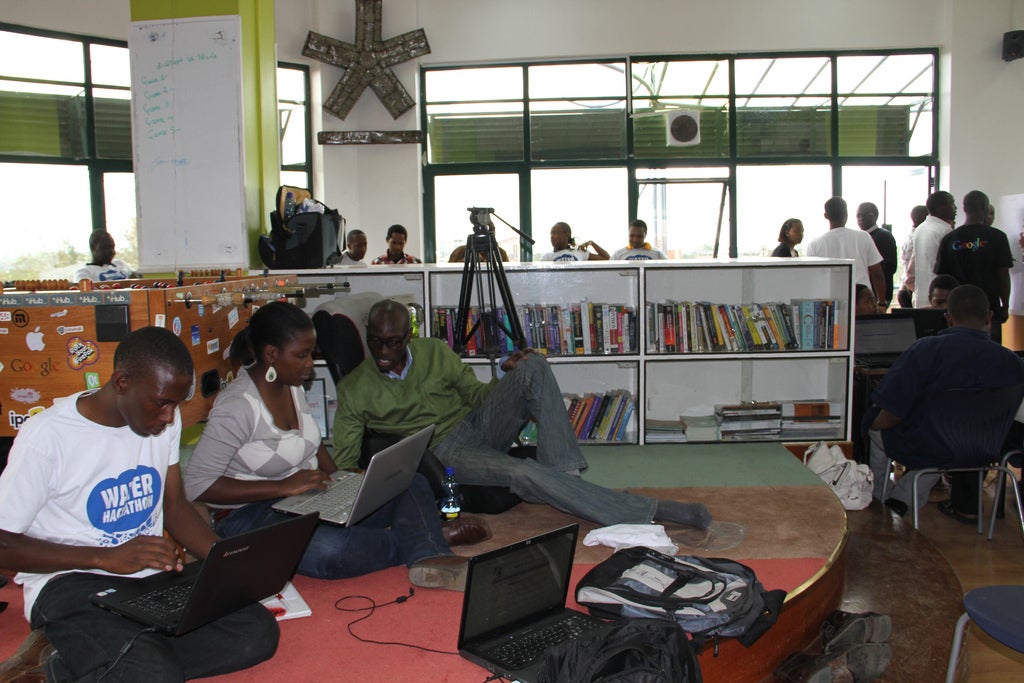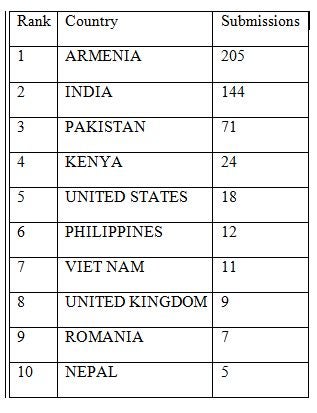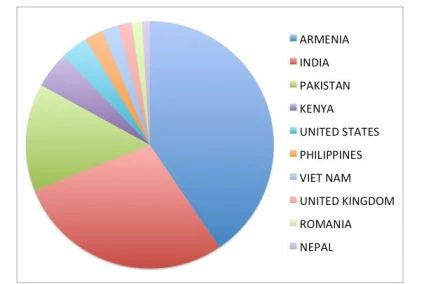 Almost two months ago, infoDev launched an online challenge to aid digital job creation in developing countries. The challenge, called m2Work (after mobile microwork), asks participants to identify real-world problems that could be addressed by millions of underprivileged people equipped with Internet-connected mobile phones. The challenge is still ongoing: most of the $40,000 prize money remains on the table, and anyone can submit ideas until April 2. Even so, a lot has already happened. Over 600 ideas have been submitted, and the jury has awarded four initial spot prizes.
Almost two months ago, infoDev launched an online challenge to aid digital job creation in developing countries. The challenge, called m2Work (after mobile microwork), asks participants to identify real-world problems that could be addressed by millions of underprivileged people equipped with Internet-connected mobile phones. The challenge is still ongoing: most of the $40,000 prize money remains on the table, and anyone can submit ideas until April 2. Even so, a lot has already happened. Over 600 ideas have been submitted, and the jury has awarded four initial spot prizes.
I am in the exciting position of being one of m2Work’s jury members. In this post, I briefly analyse the submissions and winners that we have so far, offering a few observations that should interest anyone planning to participate in the challenge, as well as anyone in the private sector development community eager to learn how this type of intervention can play out. I hasten to add that this is by no means a final analysis. The project is slated to continue, turning ideas into impact, even after the challenge itself ends.
First let me briefly recap what the m2work challenge is about. Already, hundreds of thousands of people around the world earn income from simple digital microtasks, such as moderating images posted by users to an online community, categorizing products on an e-commerce site, and transcribing digital video clips to make them more searchable. This kind of digital blue-collar work requires little training, and many microworkers are already located in the developing world.
But the poorest people in the world have no access to computers to do microwork on. This limits microwork’s development impact. At the same time, mobile phones with increasingly advanced features are becoming ubiquitous even among many of the world’s poorest; phones that could well be used for doing microwork. The purpose of the m2Work challenge is to find ways to exploit this potential: to accelerate the emergence of microwork that can be completed on mobile phones, thus creating digital earning opportunities for some of the world’s least well-off. More details on m2Work’s background can be found in my previous post.
Ideas from the developing world Let’s look at the submissions that the m2Work challenge has received so far. The first interesting finding concerns not the content of the submissions, but the background of the people submitting them. The great majority of submitters are from developing countries. This is a striking result, considering that rich countries are generally overrepresented on the Internet.
Let’s look at the submissions that the m2Work challenge has received so far. The first interesting finding concerns not the content of the submissions, but the background of the people submitting them. The great majority of submitters are from developing countries. This is a striking result, considering that rich countries are generally overrepresented on the Internet.
The table and chart show the top ten countries that so far have yielded the most submissions. The list is topped by Armenia. This perhaps surprising result is most likely thanks to active promotion of the challenge by mLab ECA, also known as the Regional Mobile Application Laboratory for Eastern Europe, South Caucasus and Central Asia. mLabs are infoDev’s regional mobile business incubators, and there are five in total.
Many of the other developing countries in the top ten are perhaps less surprising, in that they represent large English-speaking populations with reasonable access to the Internet – that is, having the requisite capacities for participating in the challenge in the first place. But there is another much more interesting attribute that is shared by almost all of the developing countries on the list: India, Pakistan, Kenya, Philippines, Vietnam and Nepal are all countries where microwork and paid crowdsourcing are already known to be a source of income for some people. Perhaps familiarity makes it easier for ideators in these countries to propose ideas regarding mobile microwork.
The only rich countries on the list are United States and United Kingdom. United States with its Silicon Valley is a famous hotbed of innovation, so its place on the list is no surprise. United Kingdom and especially London is a significant global hub for development and philanthropic work, which might explain its prominence in a challenge such as this.
Spot prize winners
When it comes to ideas, quality is of course more important than quantity. Although all the big prizes in m2Work are still up for grabs, the jury has already awarded four weekly spot prizes to the submissions received so far. The first and second spot prizes were won by a highly capable London-based team consisting of Nadia Millington, a graduate student from Trinidad, and Luis Rosenthal, an innovator from Brazil. The third prize was awarded to Art Ilano, a professor of marketing and strategy at the University of the Philippines, and an innovator from Israel who goes by the name of ‘Frequent Flyer’, took the fourth and final spot prize with a model to process security footage using microwork.
Double development dividend?
Now let’s analyse a little the content of the spot prize winners and the other ideas received so far. This is by no means a scientific content analysis and I have not examined all of the over 600 submissions, but from what I have seen, I can offer the following impressions.
First some background. Problems addressed by microwork and crowdsourcing can be divided into two broad categories: personal and enterprise. In personal microwork, the customers are individuals or small businesses who need help with problems like labeling their personal photo collections. In enterprise microwork, the customers are large companies who need help with problems like transcribing millions of paper forms. The majority of the m2Work submissions that are within the scope of the challenge seem to fall within the personal microwork category. For example, ideators propose that microworkers could act as virtual tourist guides or convert hand-written musical scores into digital form. The second spot prize winner is a personal money manager that involves microworkers typing in scanned receipts. Why this emphasis on personal microwork? No doubt because many ideators search for inspiration in their own daily lives.
Still, enterprise microwork is well represented as well among the submissions. The third spot prize winner is a mobile market research concept, and runners-up include video transcription, translation and local business data collection ideas. The jury may prefer enterprise concepts, because their economic feasibility is often easier to imagine, compared to personal microwork concepts, which rely on attracting payments from the elusive consumer.
However, some of the best m2Work submissions seem to represent a third and very interesting category of microwork, a category that was not fully anticipated by the organizers. That category is microwork for development. For example, the first spot prize winner proposes to use mobile microwork to make certain kinds of medical diagnoses better available to people who lack access to healthcare. A runner-up proposes that funds from development donors be used to pay microworkers to achieve child literacy targets. The ideas that fall within this category are often based on direct first-hand understanding of development problems. So while m2Work may have missed some lucrative enterprise microwork ideas due to focusing on developing country ideators, it has succeeded in capturing ideas that may deliver a double development dividend: models where both the workers and the clients are development beneficiaries.


Join the Conversation